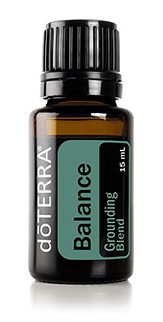
Balance
Highlights
Key Ingredients
Skim through
| Ingredient name | what-it-does | irr., com. | ID-Rating |
|---|---|---|---|
| Cocos Nucifera (Coconut) Oil | emollient, perfuming | 0, 4 | goodie |
| Picea Mariana Leaf Oil | perfuming | ||
| Cinnamomum Camphora Leaf (Camphor) Oil | |||
| Boswellia Carterii Oil | |||
| Tanacetum Annuum Flower Oil | |||
| Chamomilla Recutita (Matricarial) Flower Oil | soothing | goodie | |
| Osmanthus Fragrans Flower Extract |
doTERRA BalanceIngredients explained
There is definitely some craze going on for coconut oil both in the healthy eating space (often claimed to be the healthiest oil to cook with but this is a topic for another site) and in the skin and hair care space.
We will talk here about the latter two and see why we might want to smear it all over ourselves. Chemically speaking, coconut oil has a unique fatty acid profile. Unlike many plant oils that mostly contain unsaturated fatty acids (fatty acids with double bonds and kinky structure such as linoleic or oleic), coconut oil is mostly saturated (fatty acids with single bonds only) and its most important fatty acid is Lauric Acid (about 50%). Saturated fatty acids have a linear structure that can stack nice and tight and hence they are normally solid at room temperature. Coconut oil melts around 25 °C so it is solid in the tub but melts on contact with the skin.



The essential oil coming from the German Chamomile. It's loaded with the famous anti-inflammatory agent, bisabolol (approx. 50%) and contains 5% of soothing, antiallergic and blue color giving chamazulene. It also contains about 120 other things, including 28 terpenoids and 36 flavonoids (including some antioxidants like quercetin).
As for skincare, the essential oil is used mainly for it's anti-inflammatory and soothing properties.

You may also want to take a look at...
| what‑it‑does | emollient | perfuming |
| irritancy, com. | 0, 4 |
| what‑it‑does | perfuming |
| what‑it‑does | soothing |





